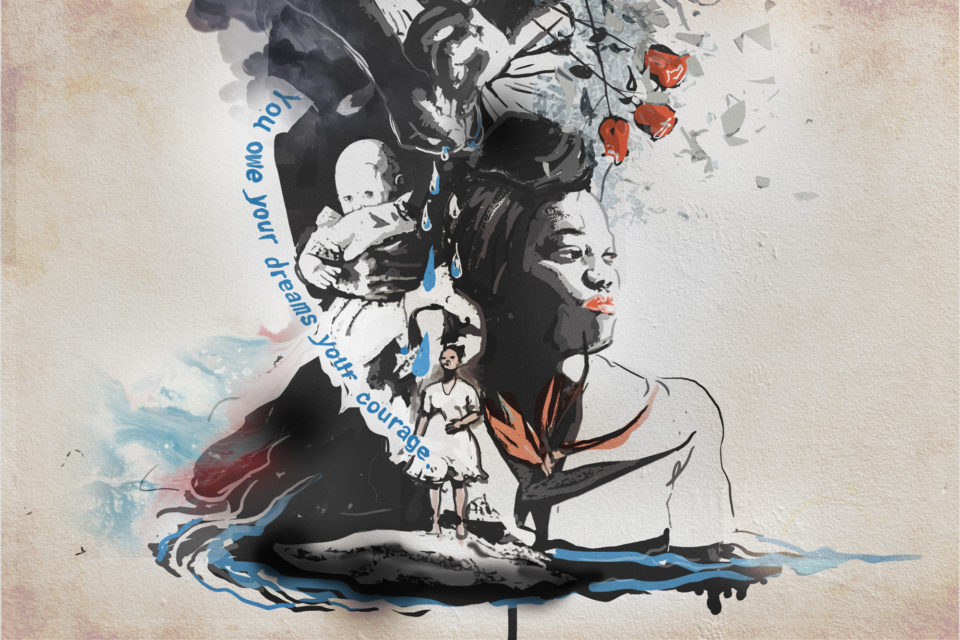The poetics of our collective amnesia
With sales of about 5 000 copies and nine print runs, Koleka Putuma’s ‘accessible and compelling’ anthology of poems is bucking the global trend of poetry selling in small numbers.
Author:
17 April 2019

“You owe your dreams your courage,” writes Koleka Putuma. Both a provocation and proclamation, this simple six-word phrase has characterised the past two years for Putuma, since the release of her debut anthology, Collective Amnesia. The phrase first existed as 27 characters on her Twitter feed in 2017. It is now tattooed on to the poet’s flesh as a reminder of accomplishing the seemingly impossible.
The anthology of poetry is a consistent unfolding of rage, joy and mourning. These multifold emotions are storied into three chapters that Putuma has titled Inherited Memory, Buried Memory and Post-Memory.
In its initial roll-out, three videos shot and edited by Jarryd Kleinhans accompanied chapter one, two and three of the anthology. These provide a glimpse into the dramaturgical components of the text accompanied by a set of arresting monochromatic portraits of the poet by Andy Mkosi, some of which show her veiled and carrying a white baby doll.
Having sold roughly 5 000 copies over nine print runs, with translations into Spanish, Danish and German, Collective Amnesia marks an interesting shift in the ways in which contemporary South African poetry has been popularly celebrated. This is especially significant considering that most publishers of poetry in South Africa, and in the English-speaking world, print anything between 200 and 500 copies.
Related article:
The text also presents a different and possibly more sustainable and marketable publishing model.
Nick Mulgrew of Cape Town-based uHlanga Press, a small poetry press, says the success of the anthology bears testament to the “viability of short-run digital printing”.
“It is now possible to affordably print super high-quality books in quantities of as low as 100,” he says. “Gone are the days where you needed to print large runs to make books affordable or profitable. You can now print books as and when you need them, and with the right warehousing and distribution, you can make sure you never have a break in supply. That’s really exciting for me, entry is now so much more accessible into the market.”
From slam to the written word
“The book has bought me a valid voice into the literary space,” muses Putuma over the phone. “You know, so there is this unsaid hierarchy that exists, where you have novelists and autobiographers at the top and maybe somewhere toward the bottom are poets, who are seen as fillers and are never quite invited to festivals or rooms in which the ‘real authors’ sit.”
Fans are not the only ones celebrating the book. The English departments at Stellenbosch University and the university currently known as Rhodes University have introduced it as an academic text.
Thinking about how and why the book did well, Mulgrew provides a simple explanation: “On the most basic level, it did well because it was a good book. If you were to think about it more deeply, however, you could say that it captured a zeitgeist.
“I think Koleka was the right writer at the right time, articulating so many truths – both comfortable and discomforting – about race, gender, sexuality, abuse and self, and the intersections between them. Just as importantly, she did it in a way that was both accessible and compelling. Poetry is seldom one of those things, and very rarely both”.
Related article:
In thinking about her transition from slam poet to author, Putuma cites American author Joshua Bennet to express her discomfort with the ways in which poets are read and understood:
“My problem with the way terms like ‘slam poet’ and ‘spoken word artist’ have been deployed in my experience is that they can become a way of marking a false dichotomy between written poetry, or even ‘strong writing’ (which gets coded as traditional, white and requiring a certain kind of study or rigour) and slam poetry, which is always already marked as overtly political, racialised, angry and devoid of the sort of intellectual labour that marks great poets, whose proper province is, ostensibly, the written word. I’m interested in what these terms connote for those unfamiliar with poetry of any kind. What draws someone who is not an avid reader of poetry to a slam as opposed to a poetry reading at a local bookstore? What is it that folks expect of one and not the other?”
Putuma’s work transcends the false dichotomies to which Bennet refers by melding the visceral snaps of slam poetry with the literary brevity associated with the written word.
Mourn quietly,
the world does not want to hear you
Putuma writes simply.


